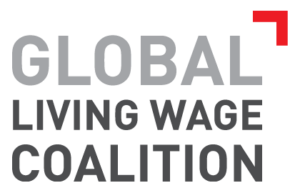The GLWC is proud to announce a new series about the actions our member organisations have taken regarding living wages. As a Coalition, we work to enable collaborative action to achieve a decent standard of living for working people and their families worldwide and each of our member organisations work towards this individually and collectively through their living wage activities. This month we are shining a spotlight on our newest member, Fair Labor Association (FLA). FLA works with companies to improve working conditions around the world and have made brilliant progress on measuring living wage progress across the manufacturing sector with its members. Below is a Q&A with FLA President and CEO Sharon Waxman on FLA’s work with the GLWC and achievements this year on living wages.
- Why was joining the GLWC important to FLA?
The GLWC is leading in the living wage movement in a way that can support workers’ rights and unions through transparency in reporting and consultation with workers and civil society. It fits our model as a multi-stakeholder initiative, and we are aligned with the GLWC in prioritizing transparency and integrity of work.
- Joining the GLWC means supporting the Anker Methodology to measure living wages. What aspects of the methodology would you highlight as unique?
We deeply respect and appreciate the expertise that the Anker Research Institute has on living wages – Martha and Richard Anker are true experts and understand the importance of transparency, integrity, and worker and stakeholder engagement. Frankly, it’s unique for us to find other organizations that share these same values and are trying to scale globally for the greater good.
The Anker Corporate Sponsorship also allows our companies to learn from their expertise, which is crucial in scaling worker impacts in global supply chains. We also see the opportunity within the Action Network to grow and strengthen worker engagement and representation within the GLWC, and are excited for what the coalition can accomplish in 2023.
- What’s your favourite thing about being part of the GLWC?
It’s rewarding to come together with like-minded people and organizations who recognize the right for workers to earn a living wage and understand the importance of transparent living wage estimates. Joining the GLWC and learning from the Action Network’s experience in using the living wage estimates by the Anker Research Institute in a variety of industries is making us better in our work. We’ve been welcomed by the Action Network and appreciate the camaraderie as we strive to execute an ambitious goal.
- What has been your biggest achievement in living wages this year?
We’re excited about the growing momentum of stakeholders in the fashion and agriculture industries on living wages for workers in supply chains, including with the GLWC. Our wage data collection tool for manufacturing industries has generated substantial interest from leaders in a variety of sectors who want to improve their living wage programs and learn more about the GLWC’s work.
I’m especially excited that in 2022 we launched a new and innovative living wage pilot to test how to improve wages in multi-buyer facilities. We’re partnering with the Research Center for Employee Relations (ERC) in Vietnam, experts on living wage in that country. The pilot is funded by the Initiative for Global Solidarity (IGS), implemented by Deutsche Gesellschaft für Internationale Zusammenarbeit (GIZ) GmbH, and supported by the German Federal Ministry for Economic Cooperation and Development (BMZ).
Our goals in this pilot are to provide training and develop and implement tools to measure progress towards living wages resulting from purchasing practices changes. These activities build on the learnings from our 2021 case study, where we saw workers’ wages increase through remediation of excessive overtime violations.
Our agriculture living income and wage program is also growing. Over the past year, we’ve developed a farmer income and wage tool for small-holder farms for our agriculture members. We’re wrapping up pilots, analyzing the results, and testing methods to scale and improve income for workers in cocoa and coffee.
- What are the biggest challenges you or your members have faced this year in living wages?
Our major challenge – as well as opportunity – is to make progress for workers and respond to the enthusiasm from business on our tools and programs.
The pandemic has created tremendous economic pressure on workers. Workers across the globe lost precious income due to layoffs or a slowdown in factory production. The need to provide a living income for workers that helps them weather economic storms is more urgent than ever as the global economy faces a potential recession.
These macroeconomic and social factors drive a lot of the interest in our wage data collection tool and Fair Compensation Dashboard. However, not every company is ready to invest in the expertise required to make progress. The more we learn about how living wage progress can be made, the more crucial it is to ensure that this is supported by buyers’ purchasing practices.
Our holistic approach to Fair Labor Accreditation, which evaluates the company’s social compliance program and purchasing practices, provides a strong foundation for our companies to execute a living wage program.
- How has FLA’s journey been towards becoming a promoter of living wages?
To be honest, it was not always easy. Many experts have contributed to FLA’s fair compensation workplans, strategies, and goals. We really started seeing significant progress after we provided our manufacturing companies with the resources and tools they needed to measure workers’ wages.
One of our key tools that came out that effort is the Fair Compensation Dashboard, which helps our companies to measure progress of workers’ wages. It debuted a month before brands in the fashion industry began pulling orders because of COVID-19.
We had a commitment to workers to ensure our members upheld their responsible purchasing practices – and urged our companies to measure workers’ wages, even knowing that their take-home pay would be affected by the mandatory shutdowns, social distancing, and outbreaks of the virus. While we hopefully won’t see downturns like we saw during COVID-19 in the future, we know that the lessons learned during this period are being used to develop tools that will help companies better manage in both good times and in challenging times.
FLA’s collaboration with GLWC is an important piece of our overall strategy in to help our members put their strong commitment to living wages for workers into action.
- What has been your most interesting project this year?
Our living wage pilot with GIZ and ERC has been a special experience. We’ve had tremendous support from our companies, civil society, and university members.
Our pilot activities are creating the space for employees to talk about their jobs and the economic realities they face to meet their basic needs. We launched the pilot with the first of three factories in October, where we focused on gathering information from workers, managers, and supervisors on their understanding of workers’ compensation and living wage. Our goal is to establish an environment within the factories that allows for a safe space to talk about living wage and how employers can uphold this right. They are incentivized to do this because their buyers are committing to support this progress through their buying, planning, and costing practices.
- What are your key living wage objectives for the next year?
As always, our goal is to make progress for workers on wages. Our 5-year strategic plan lays out objectives for us to strengthen our approaches to worker engagement, collective bargaining, and gender pay equity, so we are investing in tools and projects to tackle these issues.
We’re also preparing/supporting our companies as they begin to publicly report on wage progress. PUMA was the first Fair Labor Accredited company to incorporate living wage analysis in its sustainability report, demonstrating that it is feasible for companies and can be incorporated into due diligence directives and other reporting requirements.
Through our external engagement – including a side session at the OECD Forum on Due Diligence in the Garment and Footwear Sector in February, a masterclass on better wages with the Global Fashion Agenda, and sharing learnings from our pilot with IGS and ERC – we will continue to spread the word on how businesses can make progress in living wage.





